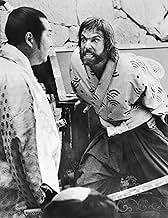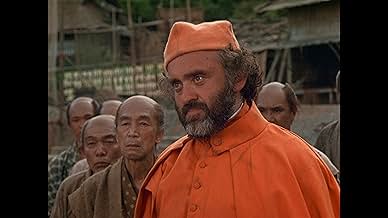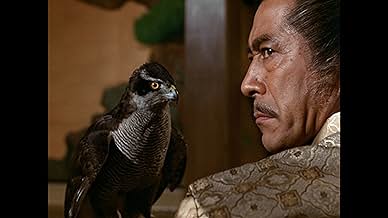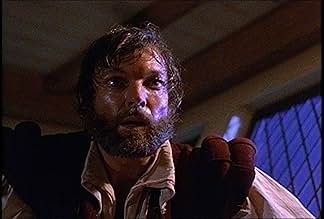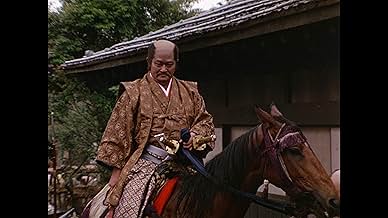Un navegante inglés se convierte a la vez en jugador y peón en los complejos juegos políticos del Japón feudal.Un navegante inglés se convierte a la vez en jugador y peón en los complejos juegos políticos del Japón feudal.Un navegante inglés se convierte a la vez en jugador y peón en los complejos juegos políticos del Japón feudal.
- Ganó 3 premios Primetime Emmy
- 8 premios ganados y 13 nominaciones en total
Explorar episodios
Opiniones destacadas
There was a time in TV when the mini-series was king. They were great prestige products for the networks who, risking immense financial expenditure, hoped to create a cinematic masterpiece on a small screen.
SHOGUN may be the ultimate expression of this neglected TV format. Based on James Clavell's sweeping epic novel of the same name, it succeeds fully in transporting the viewer to another time and place. Through John Blackthorne's eyes (Richard Chamberlain in a now iconic performance, blending moments of delightful scenery chewing with moments of genuine emotion and subtlety), we become ever more involved in the political dealings of the Japanese nobility and the mixed motives of the Jesuits.
One of the great triumphs of SHOGUN is to ensnare the viewer despite long segments in Japanese with no subtitles. The filmmakers were trying to tell the story through Blackthorne's eyes and save for a few moments of narration explaining the dialog, we are left to slowly comprehend the action at the same pace as Blackthorne. It's a device which works wonderfully well, leaving the viewer to figure out what's going on through context and character.
In addition to Chamberlain, SHOGUN is replete with glorious performances. Toshiro Mifune's Toranaga, a Japanese nobleman with grand political designs, possesses great power and yet Mifune's performance is also very nuanced. Toranaga is a man who's mind is always trying to figure three steps ahead and we see this aspect of Toranaga's personality in Mifune's work- a considerable feat considering his dialog is exclusively in Japanese and without subtitles.
Yoko Shimada plays Mariko with a captivating beauty and ethereal grace. Becoming Blackthorne's interpreter and love interest, we cannot take our eyes off of her. Her performance is made doubly impressive by the fact that Ms. Shimada spoke no English and had to be told what her lines met with great care.
Additionally, John-Rhys Davies gives a wonderfully bravura turn as Rodrigues and Damien Thomas gives his Father Alvito real depth and dignity.
SHOGUN does show its age. The quality of the video image does have a bit of that TV glow to it and Maurice Jarre's score, seeming so lush back in 1980, sounds as if it were recorded by a very small third-rate band in a backwater recording studio- it reeks of TV. Still, these are comparatively minor quibbles to an otherwise completely engrossing epic. SHOGUN succeeds mightily in taking the viewer into a strange land filled with wonder and intrigue. By the end, it's a land you aren't ready to leave- perhaps the ultimate compliment for any film.
SHOGUN may be the ultimate expression of this neglected TV format. Based on James Clavell's sweeping epic novel of the same name, it succeeds fully in transporting the viewer to another time and place. Through John Blackthorne's eyes (Richard Chamberlain in a now iconic performance, blending moments of delightful scenery chewing with moments of genuine emotion and subtlety), we become ever more involved in the political dealings of the Japanese nobility and the mixed motives of the Jesuits.
One of the great triumphs of SHOGUN is to ensnare the viewer despite long segments in Japanese with no subtitles. The filmmakers were trying to tell the story through Blackthorne's eyes and save for a few moments of narration explaining the dialog, we are left to slowly comprehend the action at the same pace as Blackthorne. It's a device which works wonderfully well, leaving the viewer to figure out what's going on through context and character.
In addition to Chamberlain, SHOGUN is replete with glorious performances. Toshiro Mifune's Toranaga, a Japanese nobleman with grand political designs, possesses great power and yet Mifune's performance is also very nuanced. Toranaga is a man who's mind is always trying to figure three steps ahead and we see this aspect of Toranaga's personality in Mifune's work- a considerable feat considering his dialog is exclusively in Japanese and without subtitles.
Yoko Shimada plays Mariko with a captivating beauty and ethereal grace. Becoming Blackthorne's interpreter and love interest, we cannot take our eyes off of her. Her performance is made doubly impressive by the fact that Ms. Shimada spoke no English and had to be told what her lines met with great care.
Additionally, John-Rhys Davies gives a wonderfully bravura turn as Rodrigues and Damien Thomas gives his Father Alvito real depth and dignity.
SHOGUN does show its age. The quality of the video image does have a bit of that TV glow to it and Maurice Jarre's score, seeming so lush back in 1980, sounds as if it were recorded by a very small third-rate band in a backwater recording studio- it reeks of TV. Still, these are comparatively minor quibbles to an otherwise completely engrossing epic. SHOGUN succeeds mightily in taking the viewer into a strange land filled with wonder and intrigue. By the end, it's a land you aren't ready to leave- perhaps the ultimate compliment for any film.
Was 11 years old when this was on TV. "Oh you should watch this it's so good," my parents said. So I didn't watch it, of course. Then on Friday night I went in to the bedroom and turned on the set and surfed through the channels to see what was on. Came upon the last episode of Shogun and was transfixed. Yoko Shimada, so beautiful as the character Mariko, captured my young heart, and I was forever in love with Japan. Started reading the book the next day, read EVERYTHING I could get my hands on about Japan, went to Japan as an exchange student, and am now married to a Japanese girl. This is a wonderful story, and Yoko Shimada was the best choice for the part, looking so natural in Kimono. No woman ever showed more grace, except maybe Audrey Hepburn...
Without a doubt, this is the best American movie about the Orient that has been ever made. Nothing we Americans will do will ever surpass this. Next to Akira Kurosawa's amazing works, there is Shogun. Shogun is in excellent company.
Do NOT see the shortened version, see all of it. The multi tape version is great; and the single tape mini version is a travesty.
Do NOT see the shortened version, see all of it. The multi tape version is great; and the single tape mini version is a travesty.
Well like many others, Shogun fueled my first real interest in Japan. I watch it at least twice a year, and am always trying see something new, like a kid attempting to suck that one last drop from a soda pop. I inhaled the movie, as many did and I began studying it's language some time ago. When asked my interest in Japan in a Japanese course I once took, I said I watched shogun 36 times. I read the book too, and it was great. Every time I see the movie, I always get sad toward the end, cause I know it's coming and there's no more. I always wished Clavell had done a sequel, in the same time frame. Toshiri Mifune was wonderfull, and Orson Wells voice was perfect. The whole cast was great. The music was wonderful, but sadly I have never been able to find a soundtrack for it.
fi
fi
Any movie with this magnificent actor even showing up in a cameo, I give a 10. Actually, the costumes weren't very good, & a lot of the true historical facts were sometimes a little silly, but Toshiro Mifune makes the movie a classic. He's elemental, a force of nature, fantastic. Watch it just to get a glimpse of this wonderful actor's presence & charisma. The movie is based on the book by Clavell, & he did write the part of Toranaga with Toshiro in mind. The movie does follow the book pretty closely, and the book is based very loosely on an Englishman who was stranded on the Japanese Islands in the early 1600's.All-in-all, the movie on DVD is a lot better than the previous video tape that was out.
¿Sabías que…?
- TriviaWill Adams, the real-life English sea captain and adventurer who made it to Japan in the 16th century, has a street named after him in Japan: Anjin-Cho.
- ErroresAnjin-san receives a flintlock pistol as a gift from Lord Toranaga. Flintlock pistols were not in wide use until 1630, thirty years after the show's setting. The wheel lock and match lock pistols and muskets, also used in the show, are correct. Additionally, the Europeans were reluctant to export the latest firearms to Japan, preferring to keep the superior weaponry to themselves.
- Citas
[after Blackthorne's guard prevented an assassination attempt by Rodrigues]
Pilot-Major John Blackthorne: Captain Yoshinaka was right to search him. Was that your idea?
Lady Toda Buntaro - Mariko: Please excuse me, but I was afraid for you.
Pilot-Major John Blackthorne: Sad, isn't it? Not being able to trust anyone.
Lady Toda Buntaro - Mariko: It is not sad, Anjin-san. It is just one of life's most important rules.
- Versiones alternativasOriginally a twelve-hour TV miniseries narrated by Orson Welles, it was later reissued for television in a somewhat shortened version with narration by Anne Bancroft. Shogun was re-edited into a 125-minutes movie for USA network TV with the addition of a new voice over narrated by Orson Welles
- ConexionesEdited into Shogun (1980)
- Bandas sonorasBLACKTHORNE'S SHANTY
Words and Music by Eric Bercovici
Selecciones populares
Inicia sesión para calificar y agrega a la lista de videos para obtener recomendaciones personalizadas
- How many seasons does Shogun have?Con tecnología de Alexa
Detalles
- Fecha de lanzamiento
- Países de origen
- Idiomas
- También se conoce como
- James Clavell's Shogun
- Locaciones de filmación
- Productoras
- Ver más créditos de la compañía en IMDbPro
Contribuir a esta página
Sugiere una edición o agrega el contenido que falta


